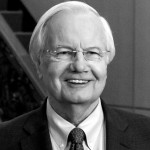Reprinted from Truthdig
Co-written by *Michael Winship

Donald Trump and Hillary Clinton during presidential election 2016
(Image by (From Wikimedia) Krassotkin (derivative), Gage Skidmore (Donald Trump), , Author: See Source) Details Source DMCA
Let's call the whole thing off.
Not the election, although if we only had a magic reset button we could pretend this sorry spectacle never happened and start all over.
No, we mean the presidential debates -- which, if the present format and moderators remain as they are, threaten an effect on democracy more like Leopold and Loeb than Lincoln and Douglas.
We had a humiliating sneak preview Sept. 7, when NBC's celebrity interviewer Matt Lauer hosted a one-hour "Commander-in-Chief Forum" in which Hillary Clinton and Donald Trump spoke with Lauer from the same stage but in separate interviews. The event was supposed to be about defense and veterans issues, yet to everyone's bewilderment (except the Trump camp, which must have been cheering out of camera range that Lauer was playing their song), Lauer seemed to think Clinton's emails were worthy of more questions than, say, nuclear war, global warming or the fate of Syrian refugees.
Of course, that wasn't a debate per se but neither are the sideshows that we call the official debates, even though the rules put in place by the nonprofit Commission on Presidential Debates are meant to insure a certain amount of fairness and decorum -- unlike the trainwreck of "debates" during the primary season, which were run solely by the parties and media sponsors with no adult supervision.
But despite the efforts of the commission, the official presidential debates coming up also are dominated by the candidates and the media, and therein lurk both the problems and the reasons to scrap this fraudulent nonsense for something sane and serious.
A little history: From 1976, when President Gerald Ford faced off against Georgia Gov. Jimmy Carter, the three presidential debates and one vice presidential debate were administered by the League of Women Voters, which did an admirable job under trying circumstances. But then, as historian Jill Lepore writes in an excellent New Yorker article on the history of presidential debates, the Reagan White House wanted to wrest control from the League and give it to the networks. According to Lepore:
"During Senate hearings, Dorothy Ridings, the president of the League of Women Voters, warned against that move: 'Broadcasters are profit-making corporations operating in an extremely competitive setting, in which ratings assume utmost importance.' They would make a travesty of the debates, she predicted, not least because they'd agree to whatever terms the campaigns demanded. Also: 'We firmly believe that those who report the news should not make the news.'"
Ridings' prescience proved correct and then some. In 1988, the League pulled out of the Bush-Dukakis debates, declaring in a press release, "It has become clear to us that the candidates' organizations aim to add debates to their list of campaign-trail charades devoid of substance, spontaneity and answers to tough questions. The League has no intention of becoming an accessory to the hoodwinking of the American public."
Walter Cronkite agreed. That same year, he wrote, "The debates are part of the unconscionable fraud that our political campaigns have become. Here is a means to present to the American people a rational exposition of the major issues that face the nation, and the alternate approaches to their solution. Yet the candidates participate only with the guarantee of a format that defies meaningful discourse. They should be charged with sabotaging the electoral process."
But as Ridings said, it's not just the candidates involved in this criminal hijacking of discourse. The giant media conglomerates -- NBCUniversal (Comcast), Disney, CBS Corp., 21st Century Fox, Time Warner -- have turned the campaign and the upcoming debates into profit centers that reap a huge return from political trivia and titillation. A game show, if you will -- a farcical theater of make-believe rigged by the two parties and the networks to maintain their cartel of money and power.
"Debating," Jill Lepore writes, "like voting, is a way for people to disagree without hitting one another or going to war: it's the key to every institution that makes civic life possible, from courts to legislatures. Without debate, there can be no self-government." But the media monoliths have taken the democratic purpose of a televised debate -- to inform the public on the issues and the candidates' positions on them -- and reduced it to a mock duel between the journalists who serve as moderators -- too often surrendering their allegedly inquiring minds -- and candidates who know they can simply blow past the questions with lies that go unchallenged, evasions that fear no rebuke and demagoguery that fears no rebuttal.
Remember that it was CBS CEO Leslie Moonves who whooped about the cash to be made from the campaign, telling an investors conference in February, "The money's rolling in and this is fun. I've never seen anything like this, and this going to be a very good year for us... Bring it on, Donald. Keep going. Donald's place in this election is a good thing." Oh, yes, good for Moonves' annual bonus, but good for democracy? Don't make us laugh. Elaine Quijano of CBS News will be moderating the vice presidential candidates' debate on Oct. 4, with Moonves looking over her shoulder.
(Note: You can view every article as one long page if you sign up as an Advocate Member, or higher).





